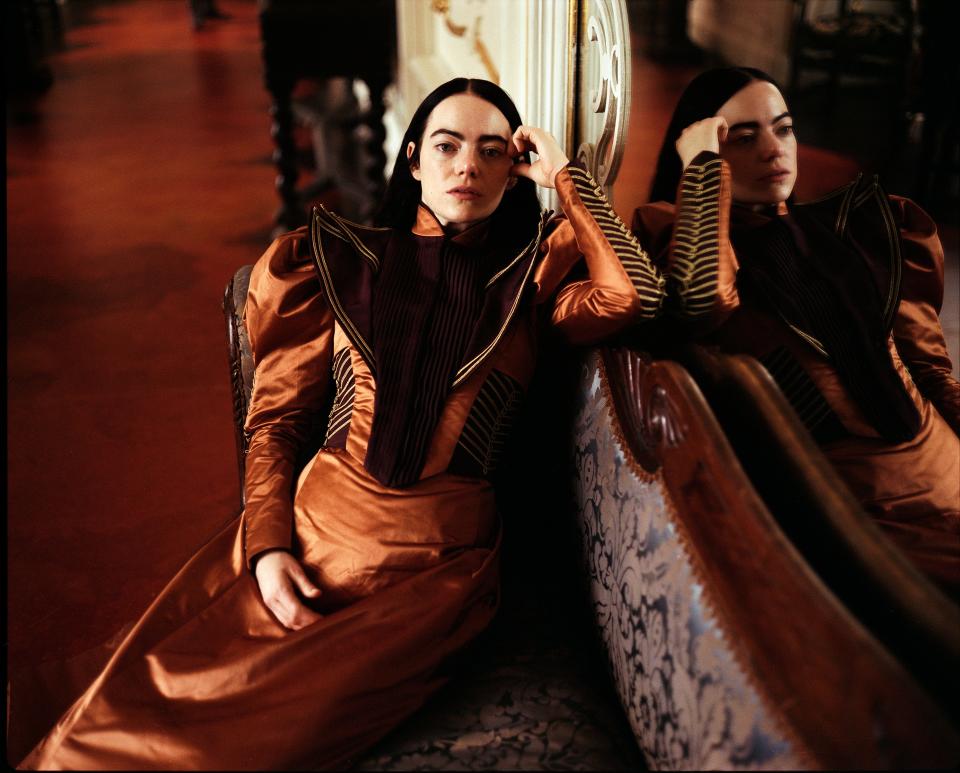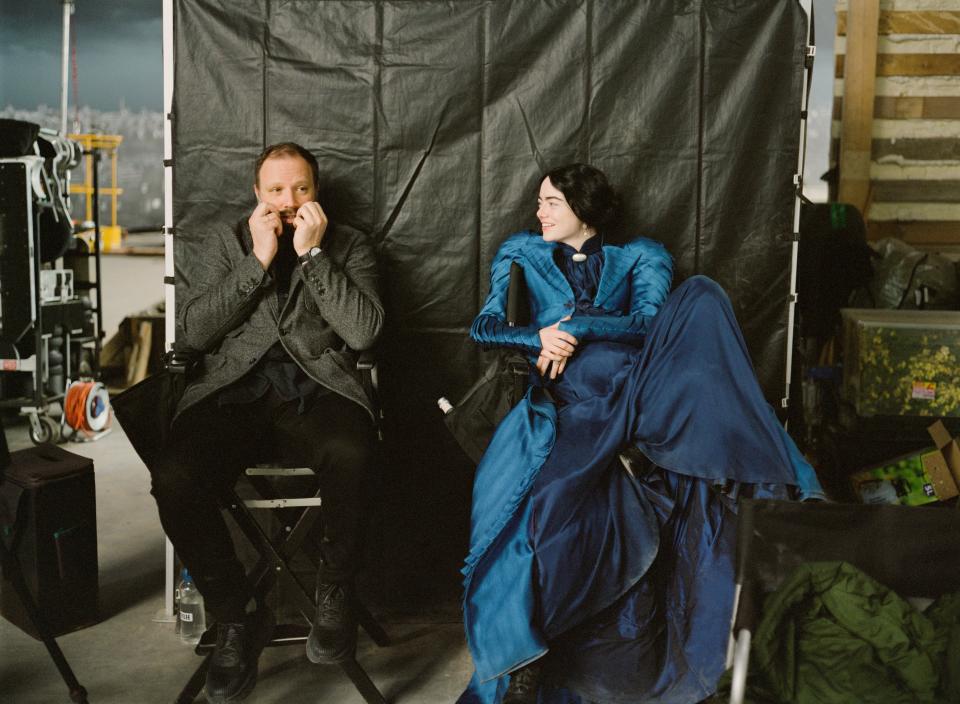How sex (and sweets) helped bring Emma Stone's curious 'Poor Things' character to life
The dark comedy “Poor Things” chronicles the liberation of a reanimated women named Bella Baxter, who evolves and grows in every way from movement and speech to her appetites for food and sex.
But is it also the liberation of Emma Stone? “That's constantly a work in progress. I'm slower moving than Bella in my development,” the actress jokes in an interview. “I just love her so much. I'm so inspired by her and her viewpoint and her curiosity and her willingness to bend and change and grow and not judge herself for it.”
Stone, 35, who scored a best actress Oscar for 2016’s “La La Land,” is a favorite for another nomination for her portrayal of Bella. In director Yorgos Lanthimos’ fantastical Victorian-era film (in theaters now), she's brought back to life, "Frankenstein" style, with the brain of an infant, courtesy of scientist/father figure Godwin Baxter (Willem Dafoe) at his London lab/estate.
When audiences first meet Bella, she’s playfully banging the keys of a piano and throwing plates, but from there the character quickly matures. She runs off with debauched lawyer Duncan Wedderburn (Mark Ruffalo) for bedroom antics and sugary treats in Lisbon, and winds up working at a Paris brothel before deciding to become a doctor like her “dad.”
Review: Emma Stone fuels 'Poor Things,' an absurdist mix of sex, pastries and 'Frankenstein'
Emma Stone's inventive, 'incredible' journey on 'Poor Things'

Watching Stone navigate the physicality and language of Bella’s evolution was “incredible,” Ruffalo, 56, says. “It's really a tour de force performance. It's like watching a tree grow: You don't see the tree growing, but one day it's giant, and that's what it was like for her with this. It was just so natural and it wasn't showy in any way, but extremely effective and astounding in its totality.”
While rehearsing scenes with Stone and “Poor Things” screenwriter Tony McNamara (who adapted Alasdair Gray’s 1992 novel), Lanthimos broke down Bella’s “journey” into five stages: “We physically figured out how she moves, how she speaks when she is in each stage, so we had this map when we were filming things out of order,” says the director.
Initially, Stone thought she might need to tap into her own adolescence to capture certain aspects of Bella’s maturing mindset. “There's history that you go through that can remind you of something that they're going through,” Stone says. “But with Bella, the amazing thing about her – and also the challenge about her – was that because she's such a creature of her own making, she's not had any of those types of experiences."
And no, she didn’t use her daughter Louise, now 2, as a role model for figuring out Bella’s most childish antics. “She was an infant at that time,” Stone says with a laugh. “It was much more sort of invented.”
Adds Lanthimos: “You can't take this thing literally. You just need to kind of translate certain things and imagine a creature like that, how it would develop.”
'Poor Things': Emma Stone's wild Frankenstein movie doesn't 'shy away' from explicit sex
Emma Stone, Mark Ruffalo loved their 'outrageous' sex scenes

Bella’s sexual awakening is an important aspect of her story, and the movie fully leans into those sequences: She very much enjoys what she calls the “furious jumping” at first, but as her feelings for Duncan ebb and Bella takes a job in a Paris brothel, having relations with many men, she doesn’t love it as much.
Ruffalo loved those intimate scenes with Stone because “it's so comedic and it's so outrageous and it's just so perverse.” And for Stone, they inform who Bella is and what she becomes.
“They are just another piece of her self-discovery and exploration of the world, whether it's sex or food or drink or politics or money or anything: the pictures she draws, the letters she writes, the philosophy she reads,” Stone explains. “She goes into it because it's pure pleasure, and it's not like she fully understands every aspect of it. I mean, nobody ever understands every aspect of sex, I'm sure, but as she moves through it and she's understanding that once she's working in the brothel, it's not always about them having a choice of (the men), and that's confusing to her. And then learning that some people like that you don't like it.

“She comes to a conclusion that she doesn't want to do it anymore, in that way,” Stone adds. “She finds it fascinating. It's just more experience and more life. Just like she doesn't regret eating Portuguese tarts until she throws up. It's too much sugar and she learns that, but it doesn't make them bad. For us to shy away from her when she has no shame or judgment about sex or her body would be disingenuous.”
After shooting the film, now “I only want to do things like this,” says Stone, who collaborated with Lanthimos on “The Favorite,” the short film “Bleat” and the upcoming anthology movie “Kinds of Kindness.” (She also co-stars with Nathan Fielder in Showtime's "The Curse.") “It's not about what other people expect of you or are looking for from you. It's about what you want to explore. What's the point of continuing on this path of being an actor or a creative person if you're not evolving and doing things that are scary?”
This article originally appeared on USA TODAY: Emma Stone on 'Poor Things' character: From sex to self-discovery
